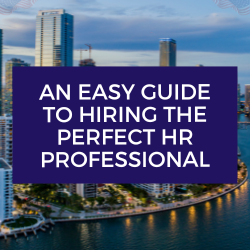Modern HR Professionals’ Approach to Performance Reviews
November 12th 2024 | Posted by Jo Thompson
Performance reviews in the evolving HR landscape are essential for employee development and overall organizational growth. To maximize their effectiveness, HR professionals must ensure these evaluations are strategically designed and executed.
Leading HR professionals in the U.S. are moving beyond outdated annual review structures and adopting continuous, data-driven, and development-focused performance review models. Below, we explore key elements of this modernized approach.
Emphasis on Continuous Feedback During Performance Reviews
Progressive HR leaders recognize that feedback should be an ongoing process rather than a once-a-year event. U.S. companies are implementing monthly or quarterly performance discussions, leveraging real-time feedback tools and performance management platforms. This shift encourages two-way communication, allowing employees to provide valuable insights to managers, fostering a culture of transparency and growth.
For insights into top performance management platforms, check out this list of leading HR tech solutions.
Strategic Goal Setting and Performance Management
Setting clear, measurable, and adaptable goals is at the core of an effective performance review process. HR professionals employ these frameworks to ensure success:
- SMART Goals (Specific, Measurable, Achievable, Relevant, Time-bound) – Aligning personal development with broader company objectives.
- OKRs (Objectives and Key Results) – Driving organizational growth while focusing on employee contributions.
- Agility in Goal Management – Adapting objectives as business needs evolve, ensuring flexibility in workforce performance expectations.
Prioritizing Employee Development
HR professionals in high-performing organizations emphasize personalized growth initiatives. This includes creating tailored development plans and providing access to continuous learning resources such as:
- Leadership development programs
- Skill-building courses and certifications
- Mentorship and coaching opportunities
Fostering career progression not only enhances employee satisfaction but also strengthens retention and engagement.
Leveraging Technology for Performance Management
Modern performance reviews integrate advanced HR technology to track progress efficiently and provide insightful analytics. Leading U.S. organizations utilize performance management software to:
- Monitor employee progress in real-time
- Generate actionable performance insights
- Enhance accessibility through mobile-friendly solutions
AI-driven analytics also help HR teams identify high performers and recognize areas requiring further development, ensuring a data-backed approach to performance evaluation.
Recognition and Reward as Performance Drivers
Acknowledging employee contributions is fundamental to sustaining motivation and engagement. Modern HR professionals structure recognition programs that:
- Offer real-time feedback and praise
- Utilize peer-to-peer recognition platforms
- Provide meaningful incentives such as bonuses, additional PTO, and career advancement opportunities
A well-structured rewards system strengthens company culture and enhances employee morale. Read more about effective employee recognition programs.
Prioritizing Employee Well-Being
In today’s workplace, employee well-being is a key performance driver. HR leaders are incorporating wellness initiatives into performance discussions to promote a healthier work environment. These include:
- Work-life balance policies (e.g., remote work flexibility, PTO expansion)
- Mental health support (e.g., counseling services, wellness programs)
- Stress management resources (e.g., mindfulness training, workload management tools)
By prioritizing well-being, HR professionals help organizations attract and retain top talent, fostering a more engaged and productive workforce.
Shaping the Future of Performance Management
The evolution of performance reviews in the U.S. is centered on continuous feedback, strategic goal-setting, development-focused initiatives, technological integration, robust recognition programs, and a strong commitment to employee well-being. By implementing these modern strategies, HR professionals cultivate an inclusive, high-performing work environment where employees feel valued and motivated to contribute to organizational success.
Incorporating these elements into performance management ensures that HR leaders drive efficiency, engagement, and long-term business growth.





